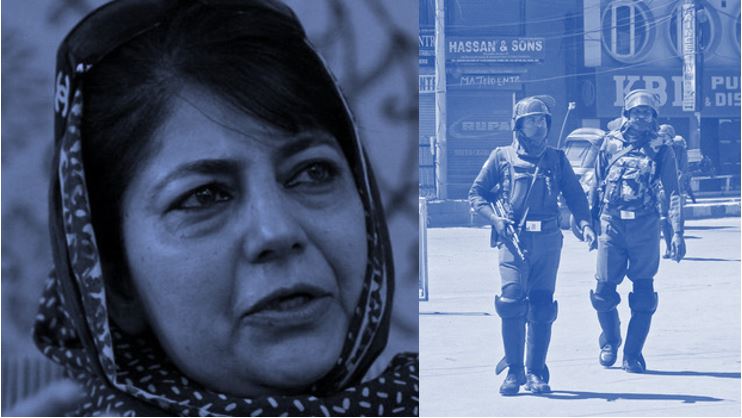Amidst the a crisis in the valley the Jammu and Kashmir Chief Minister Mehbooba Mufti has asked the centre to begin revocation of Armed Forces Special Powers Act (AFSPA) from some areas in the valley.
Source: India Today
But AFSPA is here to stay. The AFSPA, 1990 is not the root cause of growing militancy and separatism in Kashmir as the self-acclaimed intellectuals and liberals would like you to believe but a method which was formulated by the legislature in order to counter the same. The Islamic fundamentalists and the pseudo seculars have shrewdly started justifying treason and even terrorism by quoting AFSPA as the root cause of discontent among the ‘Kashmiri locals’ towards India and thus the ordinary citizen of India fails to understand the objective and effect of AFSPA in its strict sense.
The past few weeks post the death of the Hizbul Commander Burhan Wani have been particularly disturbing. What should have been celebrated as a success of the Armed Forces in their battle against terrorism has been mourned as the death of a disguised martyr. Thus, we list down reasons as to why AFSPA is the only way in which the Armed Forces can tackle the growing militancy and separatism in Kashmir.
Radicalization of the Locals:
A striking feature of militancy in Kashmir is an involvement of the brainwashed masses with the support of foreign powers something that makes it even more dangerous. The Army officers and even ‘local’ Police Officers were attacked by a religiously indoctrinated crowd followed by support and sympathy to the very same separatists by certain political outfits to the utter dismay of the security forces. The majority of the local Kashmiris no longer appear to be the victims of militancy and terrorism in Kashmir promoted by Pakistan and certain separatists but the sympathizers, supports and in certain cases even perpetrators of militancy and terrorism. The huge gatherings at funerals followed by indiscriminate stone pelting at the armed forces are testimony of the same. In certain cases, 15-20 officers in small bunkers were surrounded by 300-400 locals who started pelting stones at such officers. In such a situation it is obvious that the armed officers need to be empowered through some special provisions and cannot be expected to be subjected to the ordinary law of the land.
The extremist locals in Kashmir have been able to create such hostility with AFSPA in force just imagine what they will be able to do if AFSPA is revoked.
Hybrid war in Kashmir:
Terrorists like Burhan Wani do not appear to be only brainwashed locals but also well trained terrorists creating perfect conditions for a hybrid war in Kashmir. Very often a question is raised as to why the Army empowered under the AFSPA has been deployed in Kashmir and why can’t the State Police along with the CAPF be made to handle Kashmir. The answer is plain and simple Kashmir is not a victim of local hostility but a victim of well-planned conspiracy by a hostile neighbor leading to continuous insurgency combined with well-trained local terrorism.
Such a hybrid war cannot be taken care of by the State Police or even the Paramilitary Forces whose primary aim is to take care of the law and order situation and to keep a strict vigil on the bordering areas respectively. Given their operational capacities the Paramilitary Forces can at the best handle light insurgency or local hostility but not a Kashmir like hybrid war. The only option we are left with is a primary role for the Army empowered under the AFSPA accompanied with a supportive role played by the CRPF and other paramilitary forces.
No Constitutional infirmity:
Despite the Supreme Court of India upholding the validity of the AFSPA, the self-acclaimed intellectuals and those human rights activists worried only about the human rights of terrorists and not the Nationalist minority in Kashmir or the Armed Forces have continuously proclaimed AFSPA as violative of the Constitution.
For the purpose of understanding let’s test the AFSPA on the Constitutional anvil. The test of validity would be whether the statute is antithesis of Article 14 of the Constitution in the sense that while other States are administered by the ordinary law, Kashmir is administered by a special law (The AFSPA). Much to the dismay of the opponents of the AFSPA it is clear that the same has been imposed in Kashmir due to its peculiar circumstances and as has been repeatedly held by the Supreme Court of India what Article 14 envisages is equal treatment in the same circumstances and not that the unequal or the different should be treated alike. Thus, the AFSPA is becoming even more justifiable even as the militancy is growing in Kashmir with each passing day.
Conclusion:
The AFSPA in Kashmir is not one of several options before the Government of India but a definite compulsion. Moreover, the alleged open misuse of AFSPA does not have any valid reasoning behind it. Even in the recent upsurge of violence in Kashmir the Army and the CRPF was not guilty of entering homes and using pellet guns but compelled to use it in their own defence. The AFSPA is thus the only remedy as far as the case of Kashmir is concerned and an irrevocable necessity.
